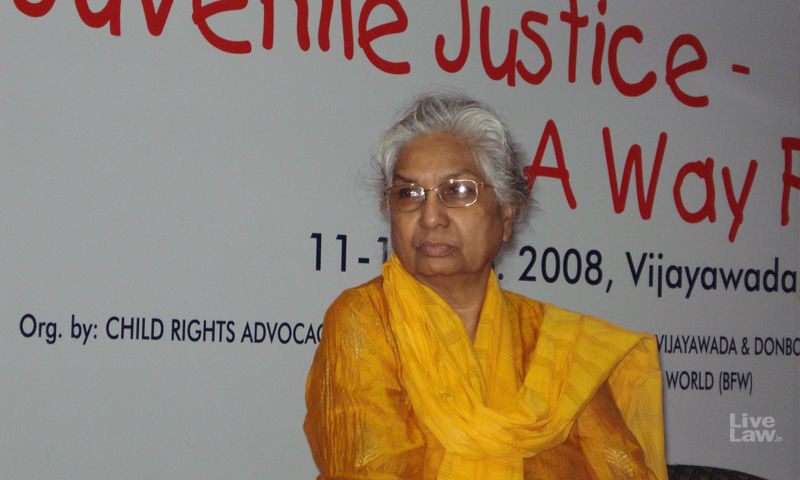Latest News
Judgement-Sheela Barse Vs. State of Maharashtra

Facts of the case:
Sheela Barse, a female who used to work as a freelance journalist, sought permission from the jail authorities to interview the female prisoners serving imprisonment in the Maharashtra State Jails. The permission for the interview was granted by the Inspector-General of Prisons and the after getting the permission to conduct the interview, the petitioner started tape-recording her interviews with the prisoners and then on knowing about the same, the permission to interview was withdrawn by the jail authority. Aggrieved by this decision of the authorities of withdrawal of the permission, the journalist moved Court by a writ petition on the ground that a citizen has a right to know under the Articles 19(1)(a) and 21 of the Indian Constitution and later when the matter came for hearing before the court, the Inspector-General of Prisons stated in his counter-affidavit that the permission granted to the petitioner was cancelled by the competent authorities on the ground that the permission was granted to the petitioner in contravention of the Maharashtra Prison Manual and was illegal and also it was stated by the respondent that the Articles of the Constitution referred to by the petitioner were not applicable in this case and also that the petitioner was not entitled to uncontrolled interviews and the factual information collected as a result of the interviews should usually be cross-checked with the authorities before it is published so that a wrong and misleading image may not be published by the media. Moving further the respondent’s counsel also stated that the interviews cannot be forced upon anyone and the willingness of the prisoners to be interviewed needs to be insisted upon before interviewing any particular individual prisoner.
Issues before the court:
- Whether by disallowing interview of prisoners, the fundamental rights of the petitioner under Article 19(1)(a) and Article 21 of the Constitution were infringed upon by the authorities?
- Whether an uncontrolled interview of prisoners was permissible as contended by the petitioner?
Court's view:
The counsels for the petitioner submitted the argument before the court that Articles 19(1)(a) and 21 guarantees every citizen reasonable access to information about the institutions that formulate, enact, implement and enforce the laws of the land, and every citizen has a right to receive such information through public institutions including the media as it is physically impossible for every citizen to be informed about all issues of public importance individually and personally. As a journalist, the petitioner has a right to collect and disseminate such kind of information to the citizens subject to limitations imposed by the Indian Constitution and the conditions prevailing in the Indian prisons where both under-trial persons and convicted prisoners are housed are directly connected with Article 21 of the Constitution. It has been contended by respondents in their written statement that the idea of segregating the prisoners from the community is to keep the prisoners under strict control.
The court, in order to decide the case, referred to the leading case of Prabha Dutt v. Union of India & Ors., where the court before considering the merits of the application, observed that the constitutional right to freedom of speech and expression conferred by Article 19(1)(a) of the Constitution is not an absolute right, nor indeed does it confer any right on the press to have unrestricted access to means of information and also that the press is entitled to exercise its right to freedom of speech and expression by publishing a matter which does not invade the rights of other citizens and which does not violate the sovereignty and integrity of India, the security of the State, public order, decency, and morality. Drawing the attention to the current case, the court held that the right claimed by the petitioner was not the right to express any particular view or opinion but the right to means of information through the medium of an interview of the two prisoners. No such right can be claimed by the press unless, in the first instance, the person sought to be interviewed is willing to be interviewed. Moving further, the court further referred to the case of S.P. Gupta & Ors. Vs. Union of India & Ors. where it was held that the demand for openness in the government is based principally on two reasons. It is now widely accepted that democracy does not consist merely of people exercising their franchise once in five years to choose their rulers, and once the vote is cast, then retiring in passivity and not taking any interest in the government. Today it is common ground that democracy has a more positive content and its orchestration has to be continuous and pervasive.
Decision by the Court:
- Disposing the application and deciding the case, the court held that public access should be granted to prisoners due to the reason that the fundamental right under Article 21 of the constitution is granted also to the prisoners, and due to the same, interviews become necessary as otherwise correct information may not be collected about the prison and conditions of the prisoners.
- The court further held that although the interviews of the prisoners are allowed, they are not uncontrolled and also that the information collected shall be verified with the competent authorities so that there may be no dissemination of any kind of wrong information and in some cases, interviews of the prisoners may also not be permitted by the authorities.
- Finally, the court held that the petitioner is free to make an application for interview of prisoners to prescribed authority and when such application is made, it shall be dealt with accordingly by the jail authorities and subject to public order, decency, and morality.
Document:



































































































